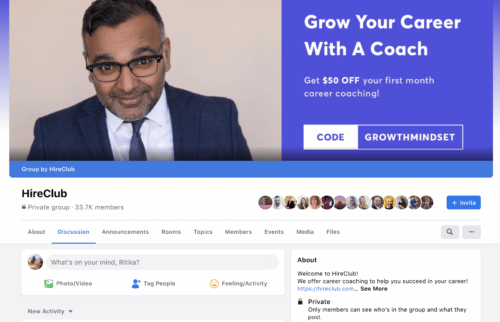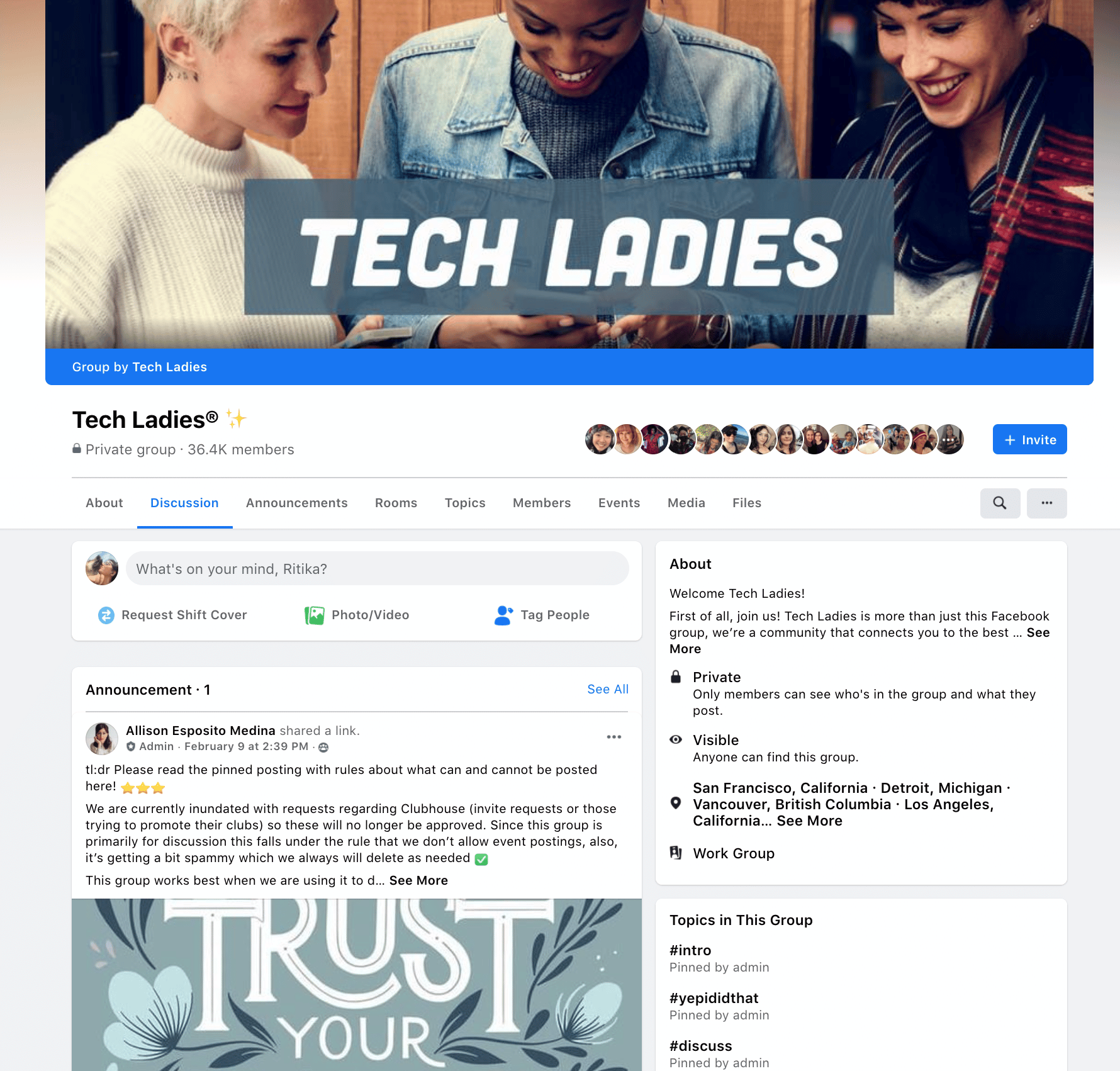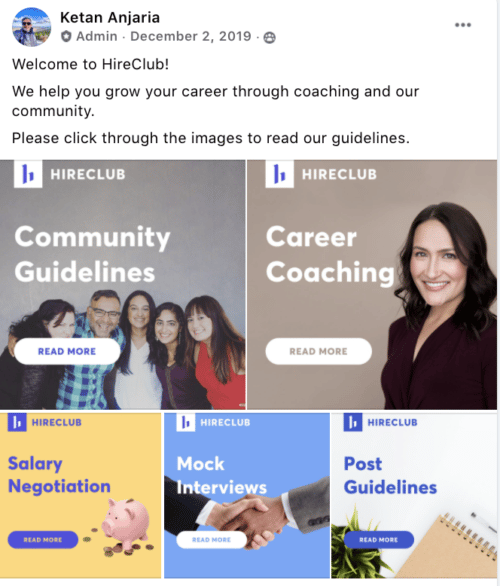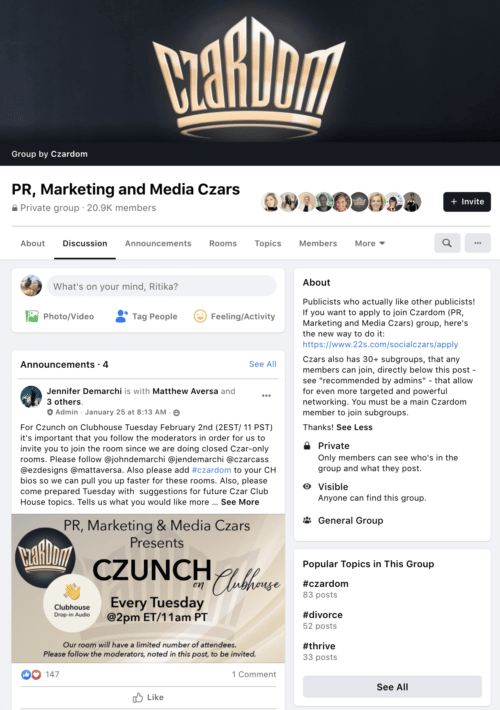Even before the pandemic, online communities were growing in popularity, becoming commonplace in peoples’ everyday lives. In a world where loneliness has become an epidemic, communities help members share ideas, ask questions, problem solve, and connect on a human level. From a business perspective, communities have an impact on ROI (return on investment) by boosting customer loyalty, lowering support costs, and increasing brand visibility.
One platform that can help you build your community is Facebook. This social network is known for cultivating an ecosystem where information, word-of-mouth recommendations, and knowledge move at rapid speeds, and virality is pretty much built into the platform; which has one of the strongest interest-based targeting algorithms in the world.
Approximately 1.8 billion people use Facebook Groups and tens of millions of groups exist on Facebook. In May 2020, Facebook Group membership grew by 3.3x, which means that there is rising demand for community. So if you’re looking to organically build and grow a community around your brand, Facebook is a great place to get started. Here are five marketing strategy tips to guide you.
1. Establish a clear mission and objective
People who join groups usually have a goal or intention in mind. Higher Logic, a technology platform that builds online communities, has found that people join membership groups for a few distinct reasons:
- The opportunity to learn new skills.
- A platform to network and meet new people.
- A resource to level up in a particular area of practice.
- An environment to build awareness around their own work.
- A place to ask questions and troubleshoot problems.
In order to be engaging, especially in a feed-style environment like Facebook where attention spans are spread thin, communities need to offer value to be magnetic.

An example of a highly active Facebook Group is HireClub, which has a 33,000 member base. HireClub’s core business offers career coaching to help people be more successful in their jobs. HireClub routinely helps people find new opportunities, receive higher salaries, and discover solutions for interpersonal challenges.
Their mission and objective has a clear, measurable, and direct impact on peoples’ livelihoods. A Facebook Group acts as a hub for HireClub’s audience to participate in webinars, download resume templates, and receive job search support. HIreClub’s Facebook Group is mission-critical, for countless people, during a time of economic crisis.
When you’re building an online community, a key question to explore is what impact your Group’s offering will have on the lives of its members. Readily accessible career assistance is invaluable for many.
2. Sync your Facebook Group to your business model
Facebook is a valuable platform for building connections at superhuman speeds. For this reason, Facebook Groups can help support your core business objectives around lead generation, paid memberships, and other offerings.

For inspiration, take a look at Tech Ladies. This professional network of women in tech hosts a Facebook Group where people can ask and answer questions, and acts as a funnel to the company’s revenue strategy — a paid, private group with webinars, training, conferences, and a job board.
The Tech Ladies Facebook Group has standalone value to members while also opening doors for audiences to engage with the brand on a deeper level. The Facebook Group is just one stepping stone on the path for the Tech Ladies to generate revenue.
3. Establish a code of conduct
On Facebook, moderation is crucial. If you’re not careful, bad actors can create an unsafe environment for the community you’re building. This problem is, unfortunately, far too common on platforms like Facebook, and in some cases, offenders can cause serious damage to your business.
For this reason, it’s important to establish a clear code of conduct and to publish it for members of your Group to read and acknowledge. This step helps your company cover its legal bases and reduces the risk of someone disrupting an otherwise positive environment. A code of conduct will also provide a safe space for groups that are prone to disrespect and marginalization.

Tech Ladies posts its community guidelines in the “About” section of its Group profile. And HireClub pinned its community guidelines, in a visual format, to the Announcements section of the Facebook Groups user interface.
If something goes wrong, or if a discussion turns disrespectful, you can point offenders to your Facebook Group’s code of conduct.
4. Unite people around a common interest
As a result of the pandemic, people are missing out on business networking and social opportunities. A Facebook Group can help bridge that gap by uniting people with common interests.
For instance, take a look at the following online community for public relations, marketing, and media experts. The Group provides valuable networking opportunities for professionals to engage in candid conversations.

PR, marketing, and media professionals have instant access to a shared pool of expertise and knowledge, and the Group provides a clear social exchange for giving and receiving value.
5. Be intentional and thoughtful about what you post
A community is more than a collection of people. It’s a platform for learning, having interesting conversations, and building strong relationships. A Facebook Group, in particular, will impact your brand’s reputation, especially since audiences are likely to see your content in a feed-style environment.
For this reason, it’s important to choose your status updates (and the content you share) with intention. How is a photo you share going to make people feel? What are the consequences of sharing a message? Are you paying attention to the substance of your content?
These questions are important to keep in mind before you start sharing news, polls, status updates, and photos. If you’re putting yourself — and your company — out there, why not put your best foot forward?
Last but not least
These days, people are suffering from isolation and seeking new ways to build human connection. We are social creatures and are hardwired to seek out meaningful relationships with others.
If your Facebook Group speaks to a pain point or goal in someone’s life, the community you build has the potential to evolve. But be serious about breathing life into this platform because a community doesn’t run on its own. It’s helpful to imagine yourself as a host of a party or educator in a classroom. A virtual space is, at its core, still a space.
In order for your marketing efforts to be successful within a Facebook Group, or other community setting, double down on your values, meet a real need, establish a safe environment, and deliver meaningful messages. If you bring people together in a way that matters, your community will take notice.
Level up your brand communications with a chatbot. Sign up for a free trial with ManyChat.














